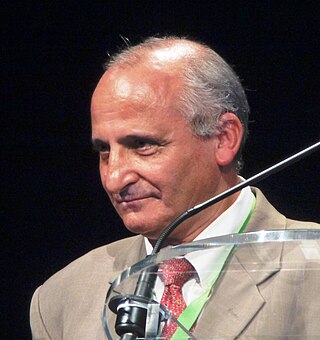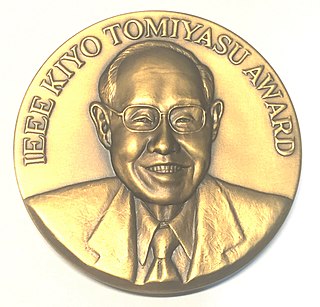
The IEEE John von Neumann Medal was established by the IEEE Board of Directors in 1990 and may be presented annually "for outstanding achievements in computer-related science and technology." The achievements may be theoretical, technological, or entrepreneurial, and need not have been made immediately prior to the date of the award.
The IEEE Daniel E. Noble Award is a Technical Field Award of the IEEE for contributions to emerging technologies. The award is named after Daniel E. Noble. The award was established by the IEEE Board of Directors in 2000, replacing the prior IEEE Morris N. Liebmann Memorial Award.
The IEEE Robert N. Noyce Medal is a science award presented by the IEEE for outstanding contributions to the microelectronics industry. It is given to individuals who have demonstrated contributions in multiple areas including technology development, business development, industry leadership, development of technology policy, and standards development. The medal is named in honour of Robert N. Noyce, the co-founder of Intel Corporation. He was also renowned for his 1959 invention of the integrated circuit. The medal is funded by Intel Corporation and was first awarded in 2000.
The IEEE Eric E. Sumner Award is a Technical Field Award of the IEEE. It was established by the IEEE board of directors in 1995. It may be presented annually, to an individual or a team of not more than three people, for outstanding contributions to communications technology. It is named in honor of Eric E. Sumner, 1991 IEEE President.

Rachid Yazami is a Moroccan scientist, engineer, and inventor. He is best known for his critical role in the development of the graphite anode for lithium-ion batteries and his research on fluoride ion batteries.
The IEEE Founders Medal is an award presented for outstanding contributions in the leadership, planning, and administration of affairs of great value to the electrical and electronics engineering profession. It may be presented to an individual or team of up to three in number. This medal was established by the Institute of Radio Engineers (IRE) in 1952. The medal continued to be awarded after the merge of the IRE with the American Institute of Electrical Engineers (AIEE) in 1963 to form the IEEE. Recipients of this medal receive a gold medal, bronze replica, certificate, and cash honorarium.
The IEEE Jack S. Kilby Signal Processing Medal is presented "for outstanding achievements in signal processing" theory, technology or commerce. The recipients of this award will receive a gold medal, together with a replica in bronze, a certificate and an honorarium.
The IEEE Dennis J. Picard Medal for Radar Technologies and Applications is an award presented for outstanding accomplishments in advancing the fields of radar technologies and their applications. This award can be presented to an individual or group of up to three people.
The IEEE Cledo Brunetti Award is an award is presented for outstanding contributions to nanotechnology and miniaturization in the electronics arts. It may be presented to an individual or a team of up to three. The award was established in 1975 by the IEEE Board of Directors.
The IEEE Control Systems Award is a technical field award given to an individual by the Institute of Electrical and Electronics Engineers (IEEE) "for outstanding contributions to control systems engineering, science or technology". It is an IEEE-level award, created in 1980 by the board of directors of the IEEE, but sponsored by the IEEE Control Systems Society.
The IEEE Electromagnetics Award was established by the IEEE Board of Directors in 1996. This award is presented for outstanding contributions to electromagnetics theory, application or education.
The IEEE James L. Flanagan Speech and Audio Processing Award is a Technical Field Award presented by the IEEE for an outstanding contribution to the advancement of speech and/or audio signal processing. It may be presented to an individual or a team of up to three people. The award was established by the IEEE Board of Directors in 2002. The award is named after James L. Flanagan, who was a scientist from Bell Labs where he worked on acoustics for many years.
The IEEE Andrew S. Grove Award is a Technical Field Award presented by the IEEE for outstanding contributions to solid-state devices and technology. The award may be presented to an individual or a team of up to three people. It was established by the IEEE Board of Directors in 1999. The award is named in honor of the lifetime achievements of Andrew S. Grove, including helping to found Intel Corporation.
The IEEE Richard Harold Kaufmann Award is a Technical Field Award of the IEEE that was established by the IEEE Board of Directors in 1986. This award is presented for outstanding contributions in industrial systems engineering.
The IEEE Photonics Award is a Technical Field Award established by the IEEE Board of Directors in 2002. This award is presented for outstanding achievements in photonics, including work relating to: light-generation, transmission, deflection, amplification and detection and the optical/electro-optical componentry and instrumentation used to accomplish these functions. Also included are storage technologies utilizing photonics to read or write data and optical display technologies. It also extends from energy generation/propagation, communications, information processing, storage and display, biomedical and medical uses of light and measurement applications.
The IEEE Frank Rosenblatt Award is a Technical Field Award established by the Institute of Electrical and Electronics Engineers Board of Directors in 2004. This award is presented for outstanding contributions to the advancement of the design, practice, techniques, or theory in biologically and linguistically motivated computational paradigms, including neural networks, connectionist systems, evolutionary computation, fuzzy systems, and hybrid intelligent systems in which these paradigms are contained.

The IEEE Kiyo Tomiyasu Award is a Technical Field Award established by the IEEE Board of Directors in 2001. It is an institute level award, not a society level award. It is presented for outstanding early to mid-career contributions to technologies holding the promise of innovative applications. The prize is sponsored by Dr. Kiyo Tomiyasu, the IEEE Geoscience and Remote Sensing Society, and the IEEE Microwave Theory and Techniques Society (MTT).

The IEEE/RSE James Clerk Maxwell Medal is an award given by the IEEE and Royal Society of Edinburgh, UK. It is named after James Clerk Maxwell (1831–1879), who made fundamental contributions to the classical theory of electromagnetic radiation. The award is presented annually, and was established in 2006.



